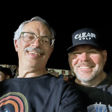
Raise the Roof.
Join hosts Jodie Jenkins and Tony Clement in this week's thought-provoking episode of "And Another Thing" as they delve into the critical issue of homelessness and housing. This week, they are joined by special guest Leigh Bursey, a passionate advocate with extensive experience in addressing housing challenges and homelessness.
In a candid and insightful conversation, Jodie, Tony, and Leigh explore the multifaceted aspects of homelessness, shedding light on the underlying causes, systemic issues, and potential solutions. They navigate through the complexities of the current housing crisis, discussing the impact on individuals and communities alike.
Tune in to gain a deeper understanding of the challenges faced by those experiencing homelessness and the importance of advocating for sustainable housing solutions. "And Another Thing" continues to bring you engaging discussions that matter, sparking conversations that go beyond the surface, and this week's episode is no exception.

